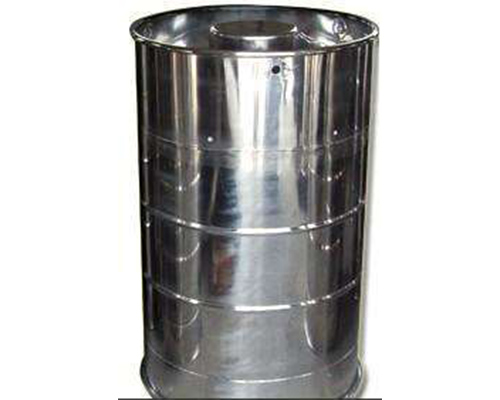
Yingkou Hengyang New Energy Chemical Co., Ltd.
Address: Xianren Island Energy and Chemical Zone, Yingkou City, Liaoning Province, via the west side of the Fourth Road
Zip code:115200
Telephone:18241754999
Fax:0417-6775999
E-mail:1313264@qq.com
Website:en.yingkouhengyang.com
In the experiment of diethyl carbonate, some catalysts were prepared by impregnation method. Lg PdCl2 was weighed and dissolved by 20ml HCl 1:1 (V:V) heating and diluted to 50ml. The catalyst carrier was immersed in a mixture of PdCl2 and additives (hydrochloric acid solution of metal compounds containing chlorine, iron, etc.) and dried. The prepared catalysts contain 2.5% Pd and 1% other metals. Put 140 g NaN02 into 1000 ml flask, add 125 ml H20, L15 ml C2H50H and shake continuously, mix well. Human sulfuric acid is dripped from a constant pressure funnel and stirred continuously. The ethyl nitrite is dried and dehydrated, and the trace oxygen is removed. After mixing with other gases, the ethyl nitrite is fed into a fixed bed continuous flow reactor (inner diameter 20 mm, length 30 mm). Catalyst loading of 3-6g was reduced to L10 (?) by hydrogen over 250 (?) C, and mixed with ethyl nitrite (flow rate 50 ml/min) and carbon monoxide 10 ml/min. 2. RESULTS AND DISCUSSION 2.1 The impregnation method using activated alumina as carrier can not obtain the required products, and the coal-based activated carbon as carrier has better catalytic effect. The activity and selectivity of the catalyst prepared by direct impregnation are worse than those prepared by drop-by-drop impregnation (Table 1), because the concentration of the latter solution is more uniform, the specific surface of the carrier is larger, and the palladium grains on the catalyst are relatively fine.
2.2 The catalyst formulation and surface area catalyst formulation of the carrier are different, and the catalytic activity is also different. The effect of No. 2 catalyst is better (Table 2).
The results showed that the order of activity of the three supported catalysts was Pd-Fe/coal charcoal>Pd-Fe/coconut shell charcoal>Pd-Fe/wood charcoal. The conversion and catalytic activity of C2H50N0 are the highest when coal-based carbon is used as catalyst carrier. More diethyl oxalate was synthesized with low specific surface area Pd-Fe/charcoal catalyst, but no diethyl oxalate was found with Pd-Fe/coal charcoal catalyst and Pd-Fe/coconut shell charcoal catalyst. The specific surface area of both catalysts was above 800 m2/g. It can be considered that the main active component is dispersed on larger specific surface carriers with smaller grains. The large specific surface area of catalyst is beneficial to the adsorption of reaction molecules on the surface of catalyst. The higher the concentration of C0 and C2H50N0 on the surface of catalyst, the higher the probability of collision between molecules, the higher the catalytic activity. The valence X-ray photoelectron spectroscopy of palladium in 2.3 catalyst showed that the binding energies of 3 d3/2 and 3 d5/2 peaks of palladium in the catalyst before reaction were 336.0 eV and 341.0 eV, while after reaction, the binding energies were 337.8 eV and 342.8 eV. After reaction, the binding energies increased by 1.8 ev. Compared with the standard spectra, it is known that the catalyst before the reaction (after reduction) is in the atomic state and after the reaction is in the oxidized state. It can be concluded that the active center of the catalytic reaction is atomic palladium.
The synthesis methods of diethyl carbonate are summarized 1. Preface Chemistry has made great contributions to human beings, but its great contributions are accompanied by heavy costs. The manufacture, use and treatment of synthetic chemicals have caused serious negative effects on human health and living environment. Environmental pollution caused by chemical industry poses challenges to chemical industry and chemical research, and also brings opportunities for research and development. With the intensification of environmental pollution control, people pay more and more attention to the three wastes-free, clean and green processes, which have become the goal of chemists, chemical engineers and chemical entrepreneurs. Green Chemistry is a new interdisciplinary subject emerging in the 1990s. It is a method to solve the problem of chemical pollution in the world. It reduces or eliminates the use and production of harmful substances by changing the inherent nature of chemical products or processes. Its purpose is to reduce or eliminate the manufacture and application of chemical products through chemical principles and methods. In use
15 harmful substances make chemicals harmless to the environment. Green chemistry of starting materials is an important factor that must be considered. The main direction of green chemistry research is to find alternative and environmentally friendly raw materials. At the same time, the media (solvents) of reaction and synthesis in the manufacturing process of green chemicals must also be considered. Reducing the use of solvents, improving traditional solvents and adopting environmentally friendly alternative solvents or solvent-free reactions are important research fields of green chemistry. Catalysts have brought tremendous progress and benefits to the chemical industry. New green catalysts not only improve efficiency, but also prevent environmental pollution. The selection and development of green catalysts is also an important research direction of green chemistry. This paper first introduces the properties and uses of diethyl carbonate, then summarizes various production methods, and concludes that the transesterification process between dimethyl carbonate and ethanol, a green chemical product, is a clean production method.
